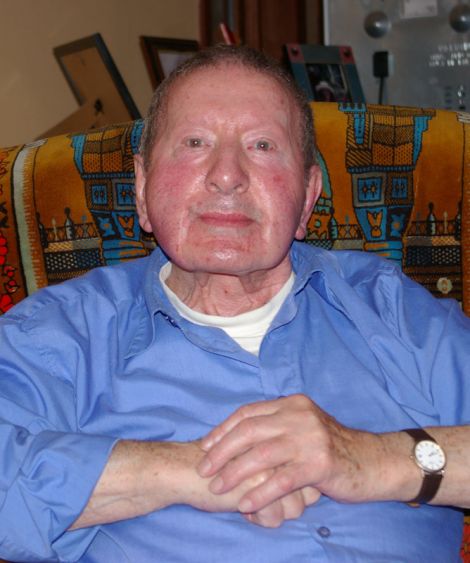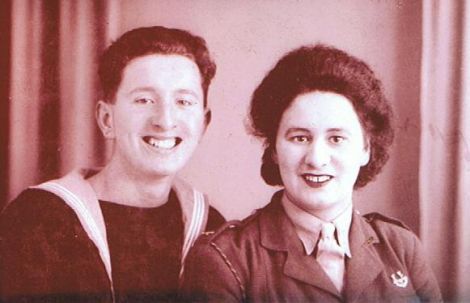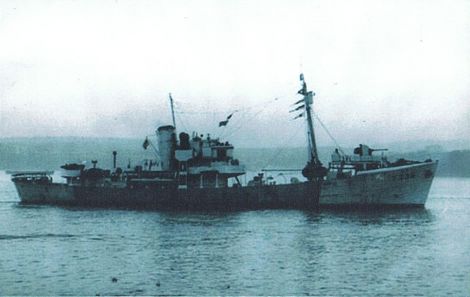Features / ‘Something I’ve always tried to forget’
Every year on Remembrance Day, the second Sunday in November, we pay tribute to the fallen from the two world wars and later conflicts. Shetlanders fought and lost their lives during all these wars.
Sandsound man Jimmy Johnston, a retired care assistant, was one of the lucky survivors. The 88 year old was within sight of the Normandy coast days before D-Day on 6 June 1944. He shares his Second World War reminiscences as an able seaman with Rosa Steppanova.
“The first body I saw was that of an American soldier. It was a shock – I was 19 years old. I thought we should take him on board so we could identify him and have his family informed, but we weren’t allowed to do that.
“There were casualties at sea, but it was the boys ashore who really had to face up to it.
“I was conscripted 70 years ago this February, I was 18 and, being a Shetlander, I decided to join the Navy. I was assigned to the Royal Naval Patrol Service (RNPS) or ‘Harry Tate’s Navy’ as it was known then.”
The name is derived from a music hall entertainer known for his clumsiness and referred to the converted drifters and trawlers that accompanied trans-Atlantic convoys and mine sweepers, classed as inferior to other naval vessels. During the Second World War the name soon became a badge of honour, as the danger of these operations and the courage of those who carried them out was recognised.
Jimmy did his training in Lowestoft and didn’t mind the “square-bashing”. He describes himself as a fit young man who enjoyed running and other sports. “I soon learned that the most important thing was to turn right or left when given the appropriate command. I had an easy time.”
Become a member of Shetland News
He recalls a ‘small world’ experience during his time in Lowestoft. “I was in a pub with a fellow Shetlander and we said to each other: ‘We can speak about anything we like, nobody’s going to understand a word of what we’re saying’, when an old lady at the next table shouted: ‘I can understand you fine, I used to follow the herring and spent many a summer in Lerwick’.
“My first ship was the Sapper, a trawler, an ugly old ship that didn’t inspire much confidence, the water used to spill in something terrible. We had a crew of about 40. The Atlantic winter crossings were the worst. We sailed in all weathers. We accompanied convoys of Liberty ships (mass-produced American cargo vessels that could be built in under a month); they brought war equipment to Britain, or took troops back to the US.
“We had two hour patrols, which were bad enough, but from midnight on they were doubled. Four-hours on deck in the freezing cold – you lost the feeling in your whole body, but I would always put a few tatties in the oven before I went on, then we had baked tatties with butter when we came off patrol. And we had coffee, good coffee; this is what I remember rather than the bad things. I was thrown into this, I had no way out.
“I remember a terrible night – I think it was in 1944. We were halfway across the Atlantic when one of the Liberty ships just broke in half. Some of those boats weren’t very well built, welded instead of riveted and not up to the weather.
“I don’t know how, but we managed to rescue every single one of the crew – 78 of them; they were soaked through and frozen, some of them were in a very poor state so we gave them our bunks and our blankets. There was nowhere for us to sleep, so we huddled together on the planks to keep warm.
“Most of our work was in mine-sweeping, a dangerous job that continued long after the end of the war. I earned several “badges”, but gave them all away, mostly to my friends in the Wrens” (WRNS, the Women’s Royal Naval Service).
Jimmy served on two more RNPS boats after leaving the Sapper, but can’t recall their names. “It’s such a long time ago. I suppose I should’ve written it all down; I’ve never spoken about my time in the war, it’s something I’ve always tried to forget.”
“The Normandy landings were the two worst weeks of my life. I’ve always enjoyed good health, and do so to this very day, but just before we were to set off for France from Portsmouth I was very unwell.
“I felt weak and had severe pains in my side and chest and found it difficult to breathe. I saw a naval doctor who said to me: ‘You’re just a coward. You’ll have to face up to the dangers just like all your comrades’. He refused to examine me.
“50 years after the Normandy landings one of my neighbours came to me with a copy of the ‘Reader’s Digest’. There was an article, several pages long, stating that the Sapper and another ship were the first to reach the Normandy coast on D-Day, 6 June 1944.
“The strange thing was that this was the second time the Sapper had reached Normandy. We got there two days before. We sailed in broad daylight, towing a midget submarine. We were an easy target, and I was very scared.
“I’ll never forget these brave submariners, three of a crew, just 50 yards behind us. We got close enough to the beaches to see the German soldiers coming out of their hide-outs. Then we were told the operation was cancelled and we had to return to base.
“Two days later we set off again, this time with the flotilla – there were thousands of boats, it was incredible – and this time I didn’t feel scared.
“It was early in the morning and the weather was terrible. I felt sorry for the crews on the landing crafts, they had such a difficult time and so much cargo, mostly supplies, was lost. I was worried about the soldiers that had been landed, their rations would be meagre.”
“And then, on that first night, came the fireworks; I’ve never seen fireworks like it again in my entire life; German aircraft dropping flares to illuminate the ships. We took down a few of them.
“There were constant bombardments and we had to be on watch around the clock. The worst was the lack of sleep. We slept on our feet for a few minutes at the time and that was that.
“I believe I’m lucky to have survived. I wasn’t thinking of myself, but I was thinking of my parents and my family all the time. I knew they were worried about me.
“When I was eventually taken to hospital I was very ill and only just managed to get there in time. They told me I had suffered from pleurisy and by then I had a collapsed lung, but I made a full recovery.
“We all survived, all my mates – we were lucky. Those mates in the navy were the best I ever had, but they’re all gone now – I was one of the youngest.”
Towards the end of my evening with Jimmy we ponder on the present day and the wars that still rage.
“All wars are terrible” he says, “and most are futile”. He talks about his father who was badly wounded in the First World War and when I ask him how he feels about his Second World War experience, he answers: “I hated it. I didn’t kill anybody – at least not directly.
“If I had had my time over again, I would have been a conscientious objector. I love all of my fellow men and I didn’t want to kill them.”
Become a member of Shetland News
Shetland News is asking its readers to consider paying for membership to get additional perks:
- Removal of third-party ads;
- Bookmark posts to read later;
- Exclusive curated weekly newsletter;
- Hide membership messages;
- Comments open for discussion.
If you appreciate what we do and feel strongly about impartial local journalism, then please become a member of Shetland News by either making a single payment, or setting up a monthly, quarterly or yearly subscription.






























































